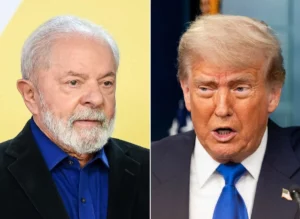
A major trade shock from the United States has forced a rare realignment in Brazilian politics.President Luiz Incio Lula da Silva, previously embattled by opposition in Congress, now sees traditional rivals standing with him after U.S.
President Donald Trump announced a sweeping 50% tariff on all Brazilian exports to the United States.The U.S.
is a key market for Brazilian products, including oil, iron, coffee, and agricultural goods.
These economic ties are significant: in 2024, Brazil exported nearly $42 billion worth of goods to the U.S.
and imported close to $50 billion in return.Trumps decision directly threatened thousands of jobs and ignited concerns across Brazils business and industrial sectors.
The trigger for these tariffs was not a trade dispute, but a political demand.Trump made tariff relief conditional on Brazil dropping its legal case against former President Jair Bolsonaro, who is on trial for allegedly trying to overturn the 2022 election results.Brazils Congress and Industry Unite Against Trumps Trade Ultimatum.
(Photo Internet reproduction)President Lula refused to intervene, citing respect for Brazils judicial independence and rejecting any foreign attempts to influence domestic affairs.Tariff Shock Unites Brazils Political CenterThis external pressure changed the mood within Brazils Congress.
The Centro, a central bloc known for shifting alliances, had been distancing itself from Lula and entertaining moves to strengthen the opposition.When the tariff announcement hit, however, this group quickly reversed course.
Instead of intensifying opposition, the Centro joined Lula in condemning outside interference and rallying to protect jobs and rule of law in Brazil.The government moved swiftly to limit economic fallout, forming an emergency committee under Vice President Geraldo Alckmin to support affected industries and organize negotiations.Financial markets reacted to the uncertainty, and companies scrambled to assess risks to exports and employment.
This episode demonstrates how a foreign policy decision can cut across political divides in Brazil.Lula gained critical political breathing room, at least for now, as leaders from business, labor, and regional governments prioritized national interests over partisan divides.The months ahead will test this unity as negotiations progress and Brazil copes with the real costs of disrupted trade.

 17
17







